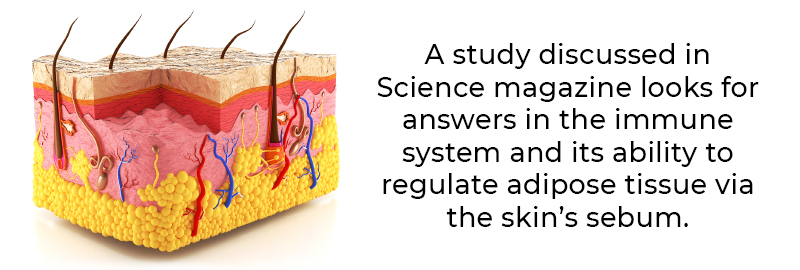In June, the FDA approved Wegovy for chronic weight management. This subcutaneous injection is the first approved drug for chronic weight management in adults with a high BMI and general obesity since 2014. With 70% of American adults being overweight or obese, there certainly seems to be room for new drug entrants to this growing market. A study recently published in Science magazine looks for answers within the immune system and its ability to regulate adipose tissue within the skin. Specifically, the study looks at the mechanisms of sebaceous gland sebum production. Sebum is comprised of a mixture of different lipids that protects and makes the skin oily. Interestingly sebum production is mediated by the immune system, more specifically CD4 and CD8 T-cells. This T-cell mediated sebum production is modulated by the holocrine secretion of the cytokine thymic stromal lymphopoietin (TSLP). TSLP, in a physiological sense, is secreted by the skin, activating the T-cell mediated sebum production used for the skin’s antimicrobial effects. However, if you genetically oversecrete or increase TSLP exogenously, then overproduction of sebum occurs, stimulating weight loss.
Researchers used a mouse model that over-expressed TSLP in the liver and found that the mice lost weight with no muscle loss reduction and improved metabolic profiles. The brilliance of the research found that while normal T-cell mediated sebum secretion used lipids and lipid debris in the skin, T-cells overstimulated by TSLP increased lipid secretion creating a lipid deficit within the skin. The T-cells mobilize more lipids to compensate for this discrepancy making up for the energy loss spent on sebum production. To mobilize more lipids and increase sebum production, the T-cells start to use circulating blood lipids. What’s fascinating is that the liver senses a drop in freely circulating lipids and starts to use the stored white fat to make up for this decrease, thereby shrinking tummies and thighs. While this all sounds very promising, there are always concerns about potentially detrimental side effects. The researchers pointed out that hypersecretion of sebum on the skin can cause pore blockages and inflammation leading to excessive acne. For some, this may be a temporary and small price to pay for that summer beach body they have been dreaming about for the past decade.
Visit us at Axxiem.com
